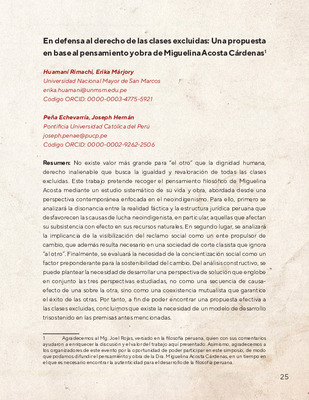| dc.contributor.author | Huamaní Rimachi, Erika Márjory | |
| dc.contributor.author | Peña Echevarría, Joseph Hernán | |
| dc.date.accessioned | 2023-07-05T16:33:05Z | |
| dc.date.available | 2023-07-05T16:33:05Z | |
| dc.date.issued | 2021 | |
| dc.identifier.uri | https://repositorio.pucp.edu.pe/index/handle/123456789/194576 | |
| dc.description.abstract | There is no greater value for “the other” than human dignity, an inalienable
right that seeks equality and revalues all excluded classes. This paper aims to collect
the philosophical thought of Miguelina Acosta through a systematic study of her life
and work, approached from a contemporary perspective focused on neoindigenism.
To this end, we will first analyze the dissonance between the factual reality and
the Peruvian legal structure that disfavor the causes of neoindigenist struggle, in
particular, those that affect their livelihood with an effect on their natural resources.
Secondly, we will analyze the implications of the visibility of the social claim as a
driving force for change, which is also necessary in a class-based society that ignores
“the other”. Finally, the need for social awareness will be evaluated as a preponderant
factor for the sustainability of change. From the constructive analysis, the need to
develop a solution perspective that encompasses the three perspectives studied,
not as a cause-effect sequence of one over the other, but as a mutual coexistence
that guarantees the success of the others, can be raised. Therefore, in order to be
able to find an effective proposal to the excluded classes, we conclude that there
is a need for a trisustainable development model based on the aforementioned
Premises. | en_US |
| dc.description.abstract | No existe valor más grande para “el otro” que la dignidad humana,
derecho inalienable que busca la igualdad y revaloración de todas las clases
excluidas. Este trabajo pretende recoger el pensamiento filosófico de Miguelina
Acosta mediante un estudio sistemático de su vida y obra, abordada desde una
perspectiva contemporánea enfocada en el neoindigenismo. Para ello, primero se
analizará la disonancia entre la realidad fáctica y la estructura jurídica peruana que
desfavorecen las causas de lucha neoindigenista, en particular, aquellas que afectan
su subsistencia con efecto en sus recursos naturales. En segundo lugar, se analizará
la implicancia de la visibilización del reclamo social como un ente propulsor de
cambio, que además resulta necesario en una sociedad de corte clasista que ignora
“al otro”. Finalmente, se evaluará la necesidad de la concientización social como un
factor preponderante para la sostenibilidad del cambio. Del análisis constructivo, se
puede plantear la necesidad de desarrollar una perspectiva de solución que englobe
en conjunto las tres perspectivas estudiadas, no como una secuencia de causaefecto
de una sobre la otra, sino como una coexistencia mutualista que garantice
el éxito de las otras. Por tanto, a fin de poder encontrar una propuesta efectiva a
las clases excluidas, concluimos que existe la necesidad de un modelo de desarrollo
trisostenido en las premisas antes mencionadas. | es_ES |
| dc.language.iso | spa | es_ES |
| dc.publisher | Pontificia Universidad Católica del Perú. Facultad de Letras y Ciencias Humanas. Especialidad de Filosofía | es_ES |
| dc.rights | info:eu-repo/semantics/openAccess | es_ES |
| dc.rights.uri | http://creativecommons.org/licenses/by-nc-nd/2.5/pe/ | * |
| dc.subject | Miguelina Acosta | es_ES |
| dc.subject | Reclamo social | es_ES |
| dc.subject | Neoindigenismo | es_ES |
| dc.subject | Igualdad jurídica | es_ES |
| dc.subject | Conciencia social | es_ES |
| dc.subject | Social claim | es_ES |
| dc.subject | Neo-indigenous | es_ES |
| dc.subject | Legal equality | es_ES |
| dc.subject | Social
conscience | es_ES |
| dc.title | En defensa al derecho de las clases excluidas: Una propuesta
en base al pensamiento y obra de Miguelina Acosta Cárdenas | es_ES |
| dc.type | info:eu-repo/semantics/conferenceObject | es_ES |
| dc.type.other | Congreso | |
| dc.subject.ocde | https://purl.org/pe-repo/ocde/ford#6.03.01 | es_ES |
| dc.publisher.country | PE | es_ES |
| dc.relation.conferencedate | Noviembre 19-20, 2021 | |
| dc.relation.conferencename | XVII Simposio de Estudiantes de Filosofía PUCP | |
| dc.relation.conferenceplace | Lima, Perú | |
| dc.contributor.corporatename | Pontificia Universidad Católica del Perú | |


